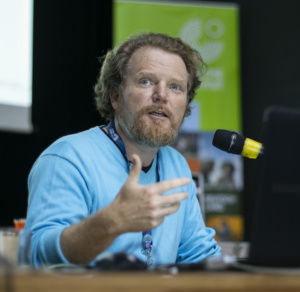A clear future vision is key to redefining the way we do business today. If we want to become part of the solution, it is essential to create time and space to reflect on what kind of future we would like to contribute to; how can we make the wellbeing of people and the planet an integral part of our business goals?

Marcos Leite, OLX Brazil
“We need to think beyond shareholder value and aim for improving people’s lives.”
Marcos Leite, COO, OLX Brasil
A business that will succeed is one that is able to make decisions that favour people and the planet where there might be a trade off with the goal of profit maximisation.
Why does common business logic no longer serve us?
The assumptions upon which the current economic system were built, simply no longer hold true: Jean-Baptiste Say articulated in 1803 that ‘natural resources cannot be exhausted’, therefore they are ‘out of the scope of economic sciences’.
Thomas Pikkety in his book ‘Capital’ showed to be false the assumption that free market capitalism will ensure the returns from capital and labour stay in balance. The returns from capital will always exceed those from labour under the current system, inevitably leading to ever growing inequality in economic life.

Daniel Christian Wahl
“The economic and monetary system is still driving the process: Our current system has an inbuilt growth imperative and structure drives behaviour. In all of our good intentions to redesign things, we are not going deep enough. We need to be more radical if we want to make a difference.”
says Daniel Wahl, author of ‘Designing Regenerative Cultures’*.
To compound all of this, current company law (in many jurisdictions) is not explicit in its support for businesses to incorporate environmental and social impacts into their approach to business.
So, what can we do?
Most decision-makers gradually move into improving employee wellbeing ,supplier relationships and addressing community concerns to secure their market position and talent. While this has certain value, often the real deal lies in finding the hidden opportunity:
How can we be the first to rethink our industry model, delivering products and services that add to human and ecological wellbeing?
Given the increasing importance of environmental and societal challenges, redirecting the value creation of our businesses’ product or service offerings to serve society and the planet ensures business survival. In most cases this also means involving colleagues, and stakeholders in the process and adapting the vision of a wellbeing economy to each local context:

Rehema Isa, Womanomics
“Until we picture wellbeing in different cultural contexts we will not know what it actually means.”
Rehema Isa, Founder of Womanomics, South Africa
Ultimately, it also comes down to the question of how we want to leave this place behind for future generations and what a fulfilled life would truly look like for us as individuals, those we care about and for those we do business with.
- Read the case study: Futuro Forestal: Making reforestation economically viable
- This is an extract from the forthcoming ‘The Business of Wellbeing – Alternatives to Business as Usual’ Guide, launching in January 2020. For more extracts, please click here
- To stay informed of the release of each extract, please sign up to our newsletter here.
*Find out more about Designing Regenerative Cultures by Daniel Christian Wahl here.
the discussion?
Let us know what
you would like
to write about!
